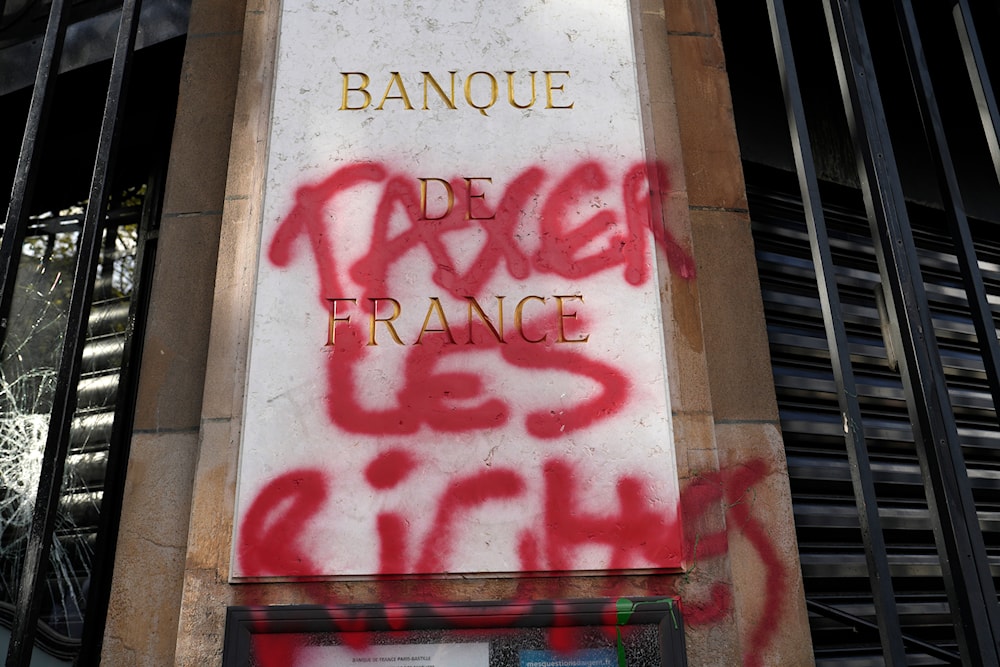European Parliament reaches contested budgetary rule deal
The European Parliament has passed a critical budget rules law, which will allow member states flexibility in drawing up their budgets.
-

A graffiti reads "Tax the rich" onto the facade of Banque De France during a protest opposing the French government's reforms, in Paris, France, on April 13, 2023. (AP)
The European Parliament and member states reached an agreement to reform the European Union's (EU) budgetary rules, in which the body hopes to boost investment and keep expenditure under control.
The law, which was passed early on Saturday, will supposedly modernize the EU budgetary rules first implemented in the 1990s. Known as the Stability and Growth Pact, the previous rules limit countries' debt to 60% of gross domestic product (GDP) and public deficits to 3%.
Detractors of the agreed-upon text highlighted its significant complexity, while those expressing more severe criticism viewed the law as a mechanism for imposing austerity measures on Europe.
This comes after two years of discord among member states, specifically France and Germany, over the nature of the newly agreed-upon law. The EU's member states struck a deal earlier in December and launched talks with negotiators, who finally reached an agreement earlier today.
An agreement between European lawmakers and member states still needs to be reached for the reforms to be formally adopted, allowing member states to apply the new rules to their 2025 budgets.
War with Russia prompts change
The rules, once considered rigid, faced suspension during COVID-19, allowing member states flexibility in spending to navigate the economic challenges posed by the global health crisis. As the initial debates unfolded, countries fiercely contested the extent to which these old limits should be relaxed, particularly to accommodate increased investments in key areas.
Against the backdrop of the escalation in the European continent, NATO's militarization campaign, and the EU's energy transition ambitions, several member states, led by France, advocated for greater financial leeway. Their focus was on financing critical areas such as the supply of arms to Ukraine, emphasizing the need for adaptability, as Kiev continues to drain the EU's stocks.
The resulting agreement, while maintaining previous limits on debt and budget deficits, introduces a more flexible framework, for member states to engineer their annual budgets.
Read more: NATO eyeing 'military Schengen' for personnel, equipment exchange
Germany cautiously accepts reforms
A notable shift in monitoring strategies places emphasis on expenditure trends, considered a more relevant economic indicator than deficits, which can fluctuate based on growth levels. However, Germany and its allies managed to tighten the budgetary framework by imposing a quantifiable minimum effort to reduce debt and deficits for all EU countries, a move that has added complexity to the overall restructuring.
Reactions to the reforms varied, with some expressing support for the new economic governance framework. Dutch MEP Esther de Lange hailed the agreement, stating it was much needed and ensured sound and credible fiscal rules while allowing room for necessary investment, and so did the Belgian Presidency of the Council of the EU 2024. The reforms find support from the EU's Renew liberals and a majority of the Socialist and Democrat groupings.
On the other hand, opposition stems from the Greens, some within the Socialist and Democrat group, and the left. Critics, including economist and S&D MEP Aurore Lalucq of France, denounce the changes as a return to austerity, especially after three years of suspended budgetary rules due to the pandemic and the conflict in Ukraine. Lalucq sees the reforms as a potential political error that could be exploited by populists to undermine and "attack Europe."
Read more: Spanish farmers join protests against EU agricultural policy

 4 Min Read
4 Min Read








